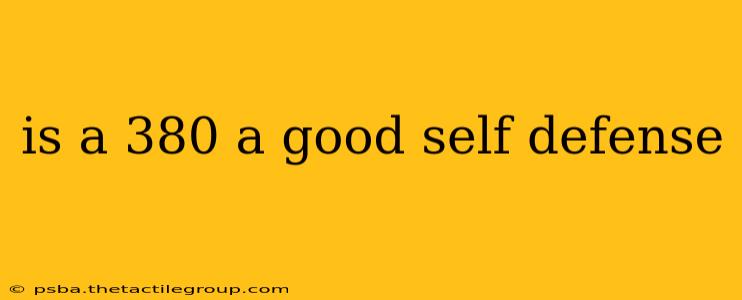Is a 380 Good for Self-Defense? A Comprehensive Look at the Caliber's Capabilities
The question of whether a .380 ACP (Automatic Colt Pistol) is a good self-defense caliber is complex and sparks frequent debate among firearms enthusiasts and experts. There's no single, universally accepted answer, as effectiveness depends on various factors beyond just the cartridge itself. This article delves into the pros and cons of the .380 ACP for self-defense, helping you make an informed decision.
Understanding the .380 ACP:
The .380 ACP is a relatively small-caliber handgun round. Its smaller size translates to lighter recoil, making it easier to control, particularly for individuals with smaller hands or less shooting experience. This is a significant advantage for self-defense, as quick follow-up shots are crucial in a stressful situation. Many consider its manageable recoil a key benefit for concealed carry, where ease of handling is paramount.
Pros of the .380 ACP for Self-Defense:
- Lightweight and Concealable: The smaller size and lighter weight make it ideal for concealed carry in various situations and clothing.
- Manageable Recoil: The reduced recoil allows for faster target acquisition and more accurate follow-up shots, even under stress.
- Wide Availability and Affordability: .380 ACP ammunition is widely available and generally less expensive than larger calibers.
- Variety of Handguns: A broad range of handguns chambered in .380 ACP exists, offering choices in size, features, and price points.
Cons of the .380 ACP for Self-Defense:
- Limited Stopping Power: Compared to larger calibers like 9mm or .45 ACP, the .380 ACP offers less stopping power. This means it may require more precise shot placement to neutralize a threat effectively.
- Penetration Limitations: The smaller bullet may not penetrate sufficiently through barriers like clothing or car doors.
- Potential for Overpenetration in Certain Situations: While generally less powerful than larger rounds, overpenetration remains a possibility, especially with certain ammunition types. This necessitates responsible handling and shot placement awareness.
Factors Beyond Caliber:
It's crucial to remember that the effectiveness of any self-defense firearm depends on several factors beyond the caliber:
- Shot Placement: Accurate shot placement is paramount, regardless of the caliber used. Even a larger caliber round will be ineffective if it misses its target.
- Marksmanship and Training: Regular practice and training are essential to develop proficiency and build confidence in handling your firearm under pressure. Consider professional self-defense training.
- Ammunition Selection: The type of ammunition used significantly impacts the performance of the .380 ACP. Self-defense ammunition should prioritize expansion and penetration to maximize its effectiveness.
- Individual Physical Capabilities: Factors such as hand size, strength, and overall physical fitness influence the ability to effectively handle and operate any firearm.
Conclusion:
The .380 ACP can be a viable option for self-defense, especially for those prioritizing concealability and ease of handling. However, its limitations regarding stopping power and penetration should be carefully considered. It is imperative to understand the limitations of this caliber and to supplement it with rigorous training and proper shot placement techniques. Ultimately, the best self-defense firearm is the one you can reliably handle, accurately shoot, and carry consistently. Consulting with experienced firearms instructors and researching different calibers and handgun models is highly recommended before making a decision. Remember, responsible gun ownership includes understanding your firearm’s capabilities and limitations, as well as adhering to all relevant laws and regulations.

